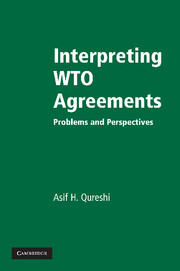Book contents
- Frontmatter
- Contents
- Preface
- List of Abbreviations
- Introduction
- 1 Interpreting principles of treaty interpretation in the WTO
- 2 Interpreting institutional aspects of the WTO Agreements
- 3 The national dimension to interpretation in the framework of the WTO
- 4 Interpreting exceptions in the WTO Agreements
- 5 Interpreting the WTO Agreements for the development objective
- 6 ‘Interpreting’ in external concerns
- 7 Interpreting the agreements on trade remedies
- Conclusion
- Annexes
- Index
Conclusion
Published online by Cambridge University Press: 23 February 2010
- Frontmatter
- Contents
- Preface
- List of Abbreviations
- Introduction
- 1 Interpreting principles of treaty interpretation in the WTO
- 2 Interpreting institutional aspects of the WTO Agreements
- 3 The national dimension to interpretation in the framework of the WTO
- 4 Interpreting exceptions in the WTO Agreements
- 5 Interpreting the WTO Agreements for the development objective
- 6 ‘Interpreting’ in external concerns
- 7 Interpreting the agreements on trade remedies
- Conclusion
- Annexes
- Index
Summary
Trends in the jurisprudence of the WTO are difficult to assess. In the first instance, the criteria against which the trends can be measured vary. Thus, the jurisprudence can be assessed according to how strict or liberal the interpretation is, how free or fair trade orientated it is, and how environmentally or development friendly it is. Second, trends have a temporal dimension. Thus, the particular time frame chosen to assess the trend can have a bearing on the assessment. Finally, assessing trends involves judgements. These can and do vary. More important, however, trends are ultimately only symptomatic of the underlying conditions within which the jurisprudence of the WTO is processed. Therefore, an examination of the underlying conditions is a much more fundamental exercise. In this vein, the focus of this monograph is very much set against the background of the underlying conditions of interpretation that give rise to the jurisprudence of the WTO.
The apparatus of interpretation is at the very core of enforcing the rights of members in the WTO dispute settlement system. As such, it has a bearing on the assertion of the development dimension by developing members within the context of the dispute settlement system. It is also very much an aspect of implementing the WTO Agreements at the national level. The WTO apparatus for interpretation, therefore, not only needs to be neutral and efficient but also, given that it is a judicial apparatus, must itself be characterised by justice and fairness. It is this latter aspect that is often lost sight of. In particular, the justice and fairness aspect of the interpretative process is pertinent to the development dimension.
- Type
- Chapter
- Information
- Interpreting WTO AgreementsProblems and Perspectives, pp. 228 - 229Publisher: Cambridge University PressPrint publication year: 2006



